Archive for August, 2009

Cayman’s facts and figures reveal snap shot of society
 (CNS): At the end of 2008 there were 2171 goats in the Cayman Islands, the country had imported 25 buses, posted over 8000 letters, had four Ukrainians on work permits and had enjoyed almost 72 inches of rain– just a few lesser known facts to be found in the new Cayman Islands Compendium of Statistics 2008. Compiled by the Economics and Statistics Office (ESO) the report is packed full of facts and figures about Cayman in 2008. From prison population to scholarship recipients the Financial Secretary Kenneth Jefferson described it as a concise and comprehensive set of measurements on social and economic activity within the islands.
(CNS): At the end of 2008 there were 2171 goats in the Cayman Islands, the country had imported 25 buses, posted over 8000 letters, had four Ukrainians on work permits and had enjoyed almost 72 inches of rain– just a few lesser known facts to be found in the new Cayman Islands Compendium of Statistics 2008. Compiled by the Economics and Statistics Office (ESO) the report is packed full of facts and figures about Cayman in 2008. From prison population to scholarship recipients the Financial Secretary Kenneth Jefferson described it as a concise and comprehensive set of measurements on social and economic activity within the islands.
Laying the report on the table of the Legislative Assembly on Wednesday morning, Jefferson pointed out that the population in Cayman at the end of 2008 was 57,009 with 56% being Caymanian and despite the recession the compendium reveals that the per capita GDP was up to $40,253.
Enrolment in private schools had increased by 8.9% and decline by 1.2 percent in the public school system; the ratio of health care professionals per 1000 population had increased from 13.2 to 14 and the unemployment rate was up at 4% with 1549 people out of work.
The report revealed that court cases and offences were down on 2007 statistics but the prison population had increased at year end from 198 to 226 of which 60 were non-Caymanian. The compendium also revealed that the number of people receiving poor relief had increased from 933 to 970.
It also showed that Cayman had embraced new technology with 98% of the population having a cell phone and 61% of homes having access to the internet. There are 121,448 telephone lines in Cayman on which people spent almost half a million minutes talking.
Jefferson said the compendium presents in a concise and simplified manner the social, economic and environmental data on the Cayman Islands up to the end of 2008. “Data was sourced and compiled from a wide cross section of both public and private sector entities,” he explained adding that when the data contained in it is compared with previous years it provides valuable indicators and was useful in identifying and analysing issues in aid of business planning and policy making.
He emphasised the importance of the compendium and said: “It serves as a document that should be accessed for information by policy makers and other agencies of government as well as by the private sector, students and researchers.
The compendium is available on the ESOwebsite: www.eso.ky

Eastern district cops nab burglars
 (CNS): A teenager was remanded in custody on Thursday, 27 August after appearing in court charged with handling stolen goods and theft. Trent Bodden, 19, of John Mclean Drive, was arrested last week by Eastern District detectives who are carrying out enquiries into a number of recent break-ins that occurred in the area. A second man, also aged 19, was arrested yesterday on suspicion of burglary, breach of bail and traffic related matter and remains in custody. Police said they have also recovered a number of stolen items including construction tools and a television set.
(CNS): A teenager was remanded in custody on Thursday, 27 August after appearing in court charged with handling stolen goods and theft. Trent Bodden, 19, of John Mclean Drive, was arrested last week by Eastern District detectives who are carrying out enquiries into a number of recent break-ins that occurred in the area. A second man, also aged 19, was arrested yesterday on suspicion of burglary, breach of bail and traffic related matter and remains in custody. Police said they have also recovered a number of stolen items including construction tools and a television set.
“Burglary is a very serious offence which can have a huge impact on the victims,” said Area Commander, Chief Inspector Richard Barrow. (pictured above) “The detectives working in the Eastern Districts are putting an enormous amount of effort into identifying those responsible.”
Residents are reminded to be extra cautious when it comes to security and always ensure their windows and doors are locked. “Leaving your home open is like an open invitation to a burglar,” said Barrow. “Make sure you do all you can to secure your home.”
People should also record the serial number of valuable items so that if they are stolen they can be easily reunited with their owner. More crime reduction advice can be found on the police website at www.rcips.ky.
Anyone with information about crime taking place in the Cayman Islands should contact their local police station or Crime Stoppers on 800-8477 (TIPS). All persons calling Crime Stoppers remainanonymous, and areeligible for a reward of up to $1000, should their information lead to an arrest or recovery of property/drugs.
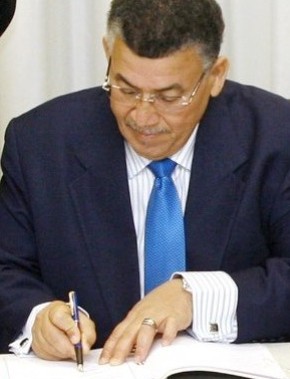
More tax deals coming
 (CNS): The government has plans to sign another 16 Tax Information Exchange Agreements, the Leader of Government Business, McKeeva Bush said this week. Eight countries are almost ready to sign new TIEAs and a further 8 are in the process of negotiation. However, the opposition has questioned some of the TIEAs which Bush recently signed and raised fears that Cayman is losing a competitive advantage by signing deals that have not held the line on certain conditions over indirect tax or gained benefits for the country.
(CNS): The government has plans to sign another 16 Tax Information Exchange Agreements, the Leader of Government Business, McKeeva Bush said this week. Eight countries are almost ready to sign new TIEAs and a further 8 are in the process of negotiation. However, the opposition has questioned some of the TIEAs which Bush recently signed and raised fears that Cayman is losing a competitive advantage by signing deals that have not held the line on certain conditions over indirect tax or gained benefits for the country.
Bush in his role as Minister for Financial Services brought a motion to the Legislative Assembly on Wednesday to add the 11 agreements which the Cayman Islands government has signed over the last year to the schedule of the Tax Information Authority Law. With the formalisation of the agreements the Leader of Government Business said that the country had not only made the coveted OECD white-list but had regained its credibility in the eyes of the financial world. Bush acknowledged the contribution made by the opposition and thanked them for “what little they did” but then told them that the reason why Cayman had ended up on the grey list in the first place was because of the previous government’s failure to sign enough agreements in time. He said his government had rescued the financial community from the rocky road of gamesmanship they had played.
He said that during the negotiations with which he was involved the PPM government had sought to negotiate commercial benefits for Cayman and hold the line on certain issues regarding indirect taxation. But, he said that he the UDP government had made concessions in the agreements this administration had negotiated with both Ireland and the Netherlands that went beyond the models required by the OECD.
After pointing out that most of deals were signed and negotiated under the PPM McLaughlin said his government had taken the position, and he thought Bush had previously agreed with it, that Cayman should gain something with the deals and attain a level playing field. He said holding the line and holding out on signing some deals had not always found favour but he still believed it was correct to try and protect Cayman’s interests. “I still believe it was the correct line to take because when everyone is on the white list if we entered into a deal with a commercial disadvantage that’s a problem,” McLaughlin noted. “There ought to be commercial advantage for us for entering into these agreements, but it seems to me, from scrutinizing part three of the agreements with Ireland and the Netherlands, there are concessions exceeding the model tier.”
McLaughlin said that the UDP government had agreed to supply information regarding indirect taxation in those countries which is not part of other agreements. The only exception he said was VAT (Value Added Tax) with the UK which he said given the relationship between Cayman and that country there was a concession.
McLaughlin went on to say that there had always been a strong economic component to these deals and Cayman should be careful and see these things in the round. He said that signing for the sake of it would not protect Cayman from the constant onslaught from the world’s major economies over this issue. “It is not a matter of getting off lists,” hes aid. “There’ll be another one soon.” He said the OECD was already spinning new compliance webs for the forthcoming G20 meeting in September.
Bush, however, said that the only commercial disadvantage had been caused by the PPM who had lost the offshore sector money because of getting the country blacklisted. He comes talking about commercial benefits,” Bush said of McLaughlin, “when he sat down for four years and made us lose revenue because he did nothing.”
The Minister said the government had worked hard to get Cayman on the white list and the country was now positioned to begin a new phase of growth and his government would be seeking to cooperate properly and listen to the financial services sector. He denied there was a problem with article three on the two agreements and said as it was the same as the UK and it made no difference. Bush also stated that he had got commercial benefits with all the ones that were now signed.

UK to set high tax on travellers to Caribbean
 (CaribWorldNews): The Caribbean tourism industry, already suffering badly from the world wide recession, could suffer another blow this November. In just months, the Caribbean could lose a substantial market if the British government goes ahead with its plan to levy an increased APD (Air Passenger Duty) from November 2009. The new rate of APD is due to be implemented in November just when the winter Caribbean season begins in earnest. Now, a family of four travelling to Barbados will pay £160 in APD – a so called `Green Tax` on air travel. But after November, that rate will go up to £200 and to £320 pounds in 2010.
(CaribWorldNews): The Caribbean tourism industry, already suffering badly from the world wide recession, could suffer another blow this November. In just months, the Caribbean could lose a substantial market if the British government goes ahead with its plan to levy an increased APD (Air Passenger Duty) from November 2009. The new rate of APD is due to be implemented in November just when the winter Caribbean season begins in earnest. Now, a family of four travelling to Barbados will pay £160 in APD – a so called `Green Tax` on air travel. But after November, that rate will go up to £200 and to £320 pounds in 2010.

Saxon nurtures tomorrow’s investors
 (CNS): Students in the Cayman Islands will get a chance to dabble in the world of finance by maintaining a hypothetical portfolio in a programme spearheaded by Cayman Islands, Saxon Administration Ltd. (Saxon), agents for Silver Thatch Pensions. All year 10 and 11 students island wide are encouraged to start a chapter of the Saxon Investment Club at their school, where they will gain invaluable insight about investing in a hands-on environment, and at the same time get a shot at winning a trip to New York City. “Our current economic climate is one that can provide a great deal of insight and education in the business of investments,” remarked CEO of Saxon Brian Williams.
(CNS): Students in the Cayman Islands will get a chance to dabble in the world of finance by maintaining a hypothetical portfolio in a programme spearheaded by Cayman Islands, Saxon Administration Ltd. (Saxon), agents for Silver Thatch Pensions. All year 10 and 11 students island wide are encouraged to start a chapter of the Saxon Investment Club at their school, where they will gain invaluable insight about investing in a hands-on environment, and at the same time get a shot at winning a trip to New York City. “Our current economic climate is one that can provide a great deal of insight and education in the business of investments,” remarked CEO of Saxon Brian Williams.
“Investing in our local youth is paramount to Saxon’s dedication to give back to the community. Saxon wanted to form a club for students to learn about the importance of investing, and to spark an interest in a future career in one of the financial industries.”
Students who participate will be formed into small teams within their school’s club to develop and maintain a hypothetical portfolio by picking stocks in accordance with the current market. This in turn will require them toresearch the companies that they have chosen for their group’s portfolio. Along with competing for monthly performance prizes, the group with the highest-earning portfolio by the end of May 2010 will win a $3,000 cash prize, which will tentatively be used for a trip to New York City where students can visit the New York Stock Exchange and local universities.
Williams continued, “We are encouraging students to invest in companies they are familiar with for their portfolios. Seeing the success that they will achieve from a brand or product that they use on a daily basis will help to fortify the idea that there is an opportunity to capitalize on their interests.”
The club will also provide invaluable knowledge about sound financial investing and money management through the careful planning of each group’s portfolio.
Students can register by contacting Brian Williams at brains.williams@silverthatch.org.ky or by calling 749-2463. All schools are eligible to participate and must register by Tuesday, September 15th.
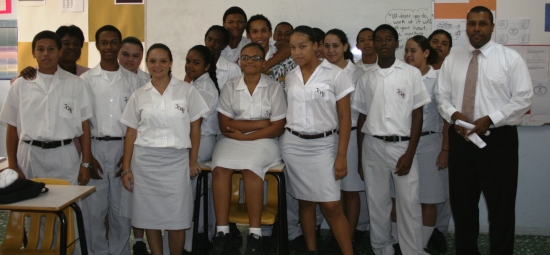
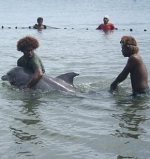
Solomon Islands sending more dolphins overseas
 (Solomon Star): In the face of international condemnation and scientific advice, the government of the Solomon Islands is poised to allow another export of wild-caught dolphins. Earth Island Institute claims that up to 18 Indo-pacific bottlenose dolphins of 30 being held in pens on Gavutu are destined to be shipped to Panama in the Caribbean in the near future. In April of this year, a working group of CITES, the body that regulates the international trade in endangered species instigated an in-depth review of trade in Solomon Islands dolphins because of its concerns about the status of dolphin populations in Solomon Island waters.
(Solomon Star): In the face of international condemnation and scientific advice, the government of the Solomon Islands is poised to allow another export of wild-caught dolphins. Earth Island Institute claims that up to 18 Indo-pacific bottlenose dolphins of 30 being held in pens on Gavutu are destined to be shipped to Panama in the Caribbean in the near future. In April of this year, a working group of CITES, the body that regulates the international trade in endangered species instigated an in-depth review of trade in Solomon Islands dolphins because of its concerns about the status of dolphin populations in Solomon Island waters.
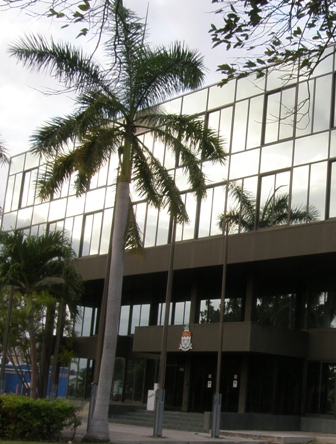
Government runs out of cash
 (CNS): With literally no money left in the treasury coffers, the government was unable to meet all of its financial obligations this month to enable it to pay civil servants, Leader of Government Business McKeeva Bush told an audience at a special meeting called to discuss the financial situation with private and public sector. Government was forced to delay payments on health insurance premiums as well as general contractors to meet the public sector pay role. The situation for next month also remains dire, with a forecasted financial position for 30 September of government incurring around CI$78.1 million in expenditure but expecting to only collect CI$29.5 million in cash.
(CNS): With literally no money left in the treasury coffers, the government was unable to meet all of its financial obligations this month to enable it to pay civil servants, Leader of Government Business McKeeva Bush told an audience at a special meeting called to discuss the financial situation with private and public sector. Government was forced to delay payments on health insurance premiums as well as general contractors to meet the public sector pay role. The situation for next month also remains dire, with a forecasted financial position for 30 September of government incurring around CI$78.1 million in expenditure but expecting to only collect CI$29.5 million in cash.
“In order to pay the salaries and wages of civil servants on payday on 25 August 2009 the government also had to take a deliberate action to postpone the payment of other expenses such as pension, health insurance, and postpone payments to contractors and other general suppliers,” Bush said at the meeting at Ritz Carlton on Thursday, 27 August.
Bush said that when the United Democratic Party came into office there were a number of capital projects that were already underway and unless the government takes the decision to stop construction and incur excessive penalty costs it is legally obligated to cover all costs associated with completing these projects.
“It is estimated that these existing capital projects will incur approximately CI$150.5 million in costs during the 2009/10 financial year. This does not include furniture and fixtures for the schools. This amount includes CI$74.5 million for the high schools and CI$39.0 million for the Government Office Accommodation Project,” Bush explained, adding that holding back the payments on these existing construction contracts to pay civil service wages was not a sustainable situation.
With no cash in the government’s day to day account, it is now using an overdraft facility and the LoGB said next month the government would be facing a cash shortage of CI$44.1 million unless the UK changes its mind and allows Cayman to draw the funds from local loans that have been secured. Government currently has around 76 million to its name but cannot easily access it. $43.4 is in the General Reserves and $25.7 is in the Environmental Protection fund. Kenneth Jefferson, Financial Secretary explained that these funds could not be used for day to day expenses and so government was already overdrawn in its regular account which he said Bryant was well aware.
Bush stated: “The government has already negotiated with local banks to borrow up to CI$372.0 million, which is required to take it through to 30th June 2010. The loan funds are ready andavailable and all that is required in order to draw down on the funds is the approval of the FCO.”
However, the FCO is currently withholding its permission on allowing borrowing to be increased until the CI government offers a new sustainable plan for revenue generation in Cayman outside of the financial services sector and preferably in the form of taxation. (See UK tells Cayman to levy taxes.)
“On 20 August 2009, the FCO informed the government that they were not convinced that the government can sustain these cost savings and therefore they were unlikely to permit any additional borrowing,” LoGB said, adding that he had asked if the CI government could at least draw on $30 million of the loan before the end of August to meet expenditure, but he said the FCO informed him that it was neither “approving or disapproving” the request but it would need to demonstrate new revenue sources for the 2009/10 financial year first. With no cash and the coffers and no approval to draw on the load, Cayman’s financial situation has reached unprecedented circumstances.
During his presentation Bush told the Ritz audience that the government had done another revision on the final sums for the financial year 2008/09 which revealed the deficit was even higher than previously thought. Government currently has loan balances of CI$598.0 million comprising of CI$416.5 million for central government and CI$181.5 million for public authorities.
Preliminary final figures, which included government’s operating revenue, was CI$487.4 million, while expenses of central government totalled CI$557.1 million, and the net loss of the public authorities was CI$11.4 million, he said. Taking the Operating Expenses and net losses away from the Operating Revenue, public Sector ended up with an operating deficit of CI$81.1 million for the year ended 30 June 2009.
If you like this article, click here to find out how to support CNS
UK tells Cayman to levy taxes
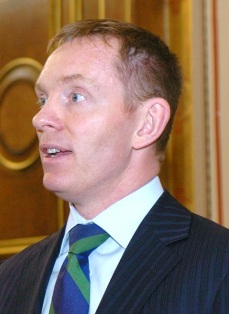 (CNS): The Cayman Islands must show plans to introduce long-term and sustainable revenue raising measures such as direct or indirect taxation before the UK will allow the CI government to borrow more cash. Though government does not have enough money to meet its immediate operating expenses for the next month, FCO Minister Chris Bryant has told McKeeva Bush he wants to see a widening of the Cayman tax base before he is prepared to approve any more debt.
(CNS): The Cayman Islands must show plans to introduce long-term and sustainable revenue raising measures such as direct or indirect taxation before the UK will allow the CI government to borrow more cash. Though government does not have enough money to meet its immediate operating expenses for the next month, FCO Minister Chris Bryant has told McKeeva Bush he wants to see a widening of the Cayman tax base before he is prepared to approve any more debt.
Speaking to an audience of both public and private sector representatives on Thursday morning (27 August) at the Ritz-Carlton (which sponsored the meeting free of charge) the leader of government business detailed the government’s current financial situation and shared a letter from the Overseas Territories Minister from the Foreign and CommonwealthOffice, Chris Bryant, regarding the request to draw down on new loans, in which the UK minister effectively refused the request.
Since the CI government broke the parameters defined by the Public Management and Finance Law during the last fiscal year with a record deficit and record borrowing, the country is now forced to gain special permission from the FCO to incur any further debts.
“Because we were not in compliance, it is the first time ever we have had to do this,” Bush told the audience. He said he could play the blame game but there was no point and the time for politics was past. The LoGB explained that he had already negotiated loans locally to the value of $372 million for the next financial year but before he could draw down on that he needed the UK’s go-ahead, which was not yet forthcoming.
Bush said that although he had submitted the cost savings of around $90 million, which was based on expenditure cuts and the pension contribution freeze, when he approached the FCO to approve the loans he had set up, he said that Bryant had told him on the telephone this week that the UK remained unconvinced that the CI government could manage further borrowing without introducing a more sustainable source of revenue.
“On Tuesday 25 August 2009, I spoke with the FCO minister to seek its approval to allow the government to borrow at least CI$30 million that is urgently needed to make current operating and capital payments,” Bush said, adding that although Bryant said he was not necessarily disapproving the borrowing requests, he was not approving them either.
In his letter to Bush, Bryant said he was alarmed that the 2007/08 operating surplus could be turned into such a large operating debt in one year and it could not be allowed to happen again and warned of the danger of Cayman heading towards a debt spiral. And while all countries including the UK are being forced to borrow to see them through the recession, they are at the same time levying taxes and reducing spending. He said the UK expects to see its overseas territories taking a responsible approach to managing finances.
“That means both ensuring a clear strategy for cutting borrowing and debt over the next three to five years, and tackling expenditure,” Bryant wrote. “I doubt that the Cayman Islands government can afford to take on extra debt without getting expenditure under control and widening the tax base. I therefore need to be absolutely convinced that there is a sustainable medium-term plan for turning around public finances and pay off the debt before being able to consider any extension of borrowing.”
The OT minister said such a plan must be realistic about future business activity and government revenues. He said it would need to factor in risk especially uncertainties in US markets and hedge funds and financial services, as well as the outcomes of the G20 summit and Michael Foot’s report on the UK’s OFCs.
“It would be unwise,” he said, “to rely too heavily on a rapid improvement in trust fund income or to expect that the Cayman Islands prosperity can presume on its offshore tax haven status. To make the public finances more resilient in the face of these uncertainties and to give me confidence that you will be able to service any new borrowings you will have to widen the tax base. I fear you have no choice but to consider new taxes perhaps payroll or property tax.”
Bryant also warned that operating expenditure had increasedtoo quickly and it needed to be controlled. He said if he could see clear progress being made he would be prepared to consider the further borrowing request and he expected to hear from the CI government about ideas in a few days.
After sharing the letter with the audience Bush asked what it was that the people of Cayman wanted, as it was evident the country needed to change. “Do we now accept the UK’s implication that we should introduce direct taxes?” he asked. “Or do we craft and implement our own vision on the way forward for a sustainable and successful economy?”
He said government had to go back to FCO with a credible plan but he was concerned that both indirect as well as direct taxes could be detrimental to business and the cost of living.
Bush spoke about a number of possible ideas that would generate revenue for government, such as the development of a new commercial port, cruise berthing to expand tourism, development of five star resorts and encouraging more foreign investments. He said that there were a number of ideas from the civil service, such as the Civil Service Association’s consideration of using its funds to buy the new government administration building; increasing fees on alcohol, tobacco and fuel duties; property tax; tax onmoney transfers; increase existing fees; investigate government possession of dormant accounts; or a national lottery, something which Bush said he would not be opposed to if there was support for it.
Above all, he said people had to be ready to accept change and in particular he warned against protectionism and anti-foreign attitudes, which he said were undermining foreign investment and driving business away. “We can’t have everything without giving up something.”
If you like this article, click here to find out how to support CNS

UCCI Cayman Brac Campus orientation
(CNS): All students who have applied for the Associate and Bachelor Degrees and Certificate Programmes at the UCCI Cayman Brac campus must attend the University College orientation to be held at Stake Bay facility on Monday, 31 August from 11.00 am to 1.00 pm. Parents and guardians are also welcome to attend. At this orientation students will meet UCCI staff and teachers to discuss the coming year at the Brac Campus. Any outstanding items on your application can be turned in at this time. The Brac Campus is at 20 Kirkconnell Street, opposite District Administration and is open Monday to Friday, 8.30 am to 5.00 pm.
Second year students are also encouraged to attend afternoon counseling sessions with UCCI Student Services Counsellors, Mary Ann Cannon and Mitch Ebanks, when they can confirm their degree programmes and class schedules for the fall semester.
A second video-link has been added at the Brac campus, and the campus now offers programmes in both Education and Legal Studies as well as second-year classes via this link.
Students can still register on-line at the UCC web site: www.ucci.edu.ky/Brac where available courses are also detailed. Classes for the Fall Semester start on Tuesday, 1st September, 2009.
Contact: Tel: 948-8128, Fax: 948-8129.

Record top grades in GCSE results in UK
 (BBC): GCSE grades have reached another record level – with more than one in five exams (21.6%) being awarded an A* or A. More than half a million teenagers in England, Wales and Northern Ireland have been receiving their results. Grades have risen almost continually since 1988 and this year more than two in three (67.1%) were between an A* and a C. Girls continue to get more A*s and As than boys. Schools in England targeted under what is called the "National Challenge" are those where fewer than 30% of pupils achieve five or more good GCSE passes (A* to C) including maths and English.
(BBC): GCSE grades have reached another record level – with more than one in five exams (21.6%) being awarded an A* or A. More than half a million teenagers in England, Wales and Northern Ireland have been receiving their results. Grades have risen almost continually since 1988 and this year more than two in three (67.1%) were between an A* and a C. Girls continue to get more A*s and As than boys. Schools in England targeted under what is called the "National Challenge" are those where fewer than 30% of pupils achieve five or more good GCSE passes (A* to C) including maths and English.